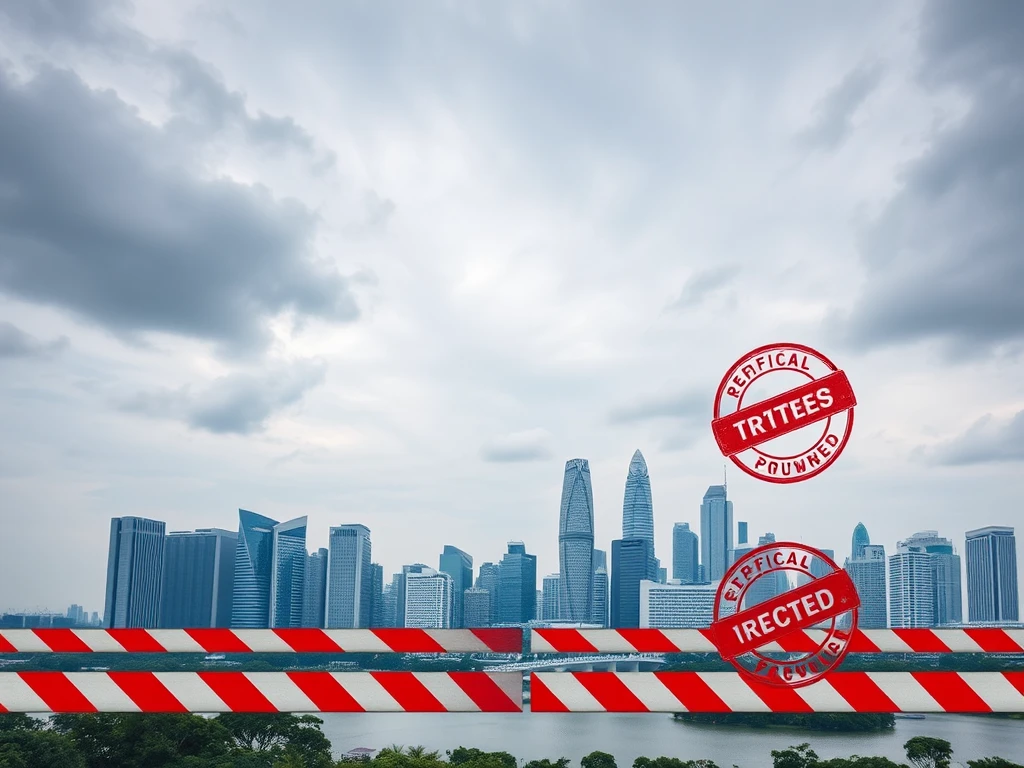Crucial Singapore Crypto Regulation: MAS Imposes Severe Near-Ban on Offshore Services

Attention, crypto enthusiasts and businesses! A significant development is shaking up the industry in a major global financial hub. Singapore, known for its forward-thinking approach, has just clarified a crucial aspect of its Singapore crypto regulation, and it spells tough news for many companies.
What the New MAS Crypto License Rule Means
The Monetary Authority of Singapore (MAS) has provided much-needed clarity on its Digital Token Service Providers (DTSPs) framework. Here’s the key takeaway:
- Starting June 30, firms offering digital token services *only* to customers outside Singapore need a license.
- However, MAS states it will “generally not issue a licence” for this type of business model.
- Licenses will only be granted in “extremely limited circumstances.”
This means obtaining a MAS crypto license for a foreign-only client base is exceptionally difficult, effectively acting as a near-ban.
Why Offshore Crypto Services Face a Near-Ban
MAS cited clear reasons for this stringent approach. The primary concerns are:
- Difficulty in effectively supervising firms operating solely offshore.
- Elevated risks related to money laundering and terrorism financing (AML/CFT).
Regulating entities whose primary activities and clientele are outside the country’s direct oversight presents significant challenges. MAS believes it is unable to effectively supervise such persons, leading to the decision to restrict these types of offshore crypto services.
Impact on Crypto Firms Singapore
So, what does this mean for businesses? Simply put, crypto firms Singapore that cannot secure the required license will have to cease their regulated activities targeting overseas clients by the June 30 deadline. This has already prompted action from some companies. For instance, WazirX, a crypto exchange based in Singapore but primarily serving India, announced it is relocating its operations to Panama following the initial announcement of the deadline.
Clarifying Digital Token Services Singapore
It’s important to understand which services are impacted. The new rules specifically target providers of services related to digital payment tokens (like Bitcoin or Ether) and tokens of capital market products when serving foreign clients. However, not all crypto-related services are affected. MAS clarified that providers dealing *only* with utility and governance tokens are generally *not* subject to this new licensing regime and are therefore not impacted by this specific change regarding overseas clients.
The Bigger Picture of Singapore Crypto Regulation
This move is consistent with Singapore’s broader strategy to maintain strict control over its digital asset landscape. While the country is recognized for its openness to fintech innovation, regulators are keen to manage risks, particularly those associated with illicit finance. Today’s announcement clarifies that companies already serving local Singaporean customers are already regulated; these new rules primarily extend the licensing requirement to those previously operating with only an overseas focus. The timing follows reports indicating high crypto awareness and adoption in Singapore, underscoring the regulator’s proactive stance in a growing market.
In conclusion, Singapore’s MAS has made it clear: serving only foreign clients with digital payment or capital market tokens from Singapore will be exceptionally difficult under the new licensing framework. This represents a significant tightening of Singapore crypto regulation and signals a challenging environment for firms without a strong local presence or unique circumstances warranting a rare license.









